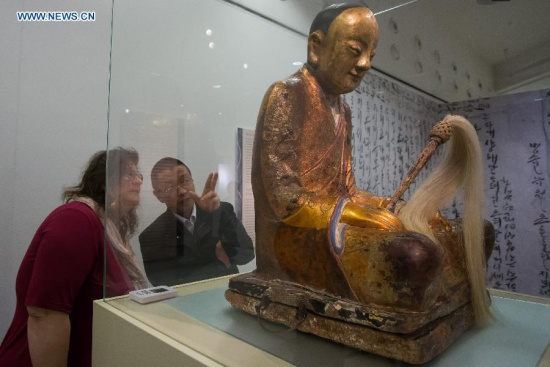

File photo taken on March 3, 2015 shows the Chinese Buddha statue at the Hungarian Natural History Museum in Budapest, Hungary. (Xinhua/Attila Volgyi)
The anonymous Dutch private collector of a Buddha statue that contains a mummified monk, which the residents of a Chinese village have claimed was stolen from their temple, said that he withdrew the relic from the ongoing exhibition to "calmly and critically evaluate the unexpected situation."
The collector's spokesman said in a statement that he made this decision "at least for the time being" because the unique Buddhist "whole-body relic" was made public for research purposes, but recent revelations have caused increased media scrutiny and concerns from Chinese Buddhist community for the mummy's presentation and safety, the Xinhua News Agency reported Tuesday.
The Buddha statue with a mummified monk inside, part of a "Mummy World" exhibition at the Hungarian Natural History Museum, which was originally scheduled to be on display till May 17, was withdrawn from the museum on Friday.
Villagers in Yangchun, Fujian Province claimed that the Buddha statute was stolen from their village's temple in 1995. The local Cultural Relics Bureau told the Global Times Tuesday that, judging from historical records, the claim might be true. The bureau said it will continue gathering information to evaluate the situation.
The collector's statement also claimed that the collector first saw the statue in mid-1995, and that the previous owner had it in their possession in 1994, before the Chinese villagers discovered their Buddha was stolen.
Local villagers told the Global Times that they signed an application letter Monday, asking the State Administration of Cultural Heritage to help trace back the statue.
"We believe the 1,000-year-old Buddha statue was the one stolen from our temple and we have been searching for it for many years," said a villager surnamed Lin.
Huo Zhengxin, a law professor with the China University of Political Science and Law, told the Global Times that "there might be difficulties in applying the 1970 UNESCO Convention to this case, as the Netherlands joined the convention in 2009 but the collector claimed that he bought it in 1996. However, we still could start tracing procedures based on the convention and require the Dutch side to assist in the investigation."
China certain ‘mummy Buddha‘ was stolen one
2015-03-25Stolen mummy possibly discovered in exhibit
2015-03-23Monk‘s body found concealed in Chinese Buddha statue
2015-02-25Mummified Buddha statue ‘stolen‘ from China, claim villagers
2015-03-22Experts call for diplomatic solution to mummified Buddha dispute
2015-03-23Authority launches campaign to retrieve lost Buddha
2015-03-24Copyright ©1999-2018
Chinanews.com. All rights reserved.
Reproduction in whole or in part without permission is prohibited.